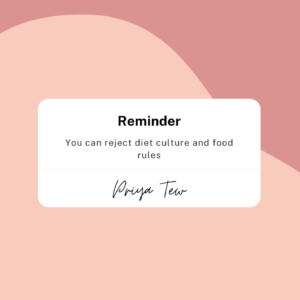Food rules can keep us stuck in diets, so one big step is working out how to overcome these mindsets.
Many thanks to Shannon Western for her help with this post.
How do you describe food?
Our attitude to food is really important and can determine if our relationship with food is healthy or not. Diet culture labels food into “good vs bad” or “clean vs dirty”, this can lead to food rules and guilt around eating certain foods. Diet culture values a smaller body vs a healthy body and can be found influencing most areas of life.

Where do our food rules come from:
We can be influenced by so many things including social media, family and upbringing, friends/colleagues, the media, books and advertising. Walking round a supermarket you are bombarded with food messages. Have you ever bought a food because you think it will make you healthier or slimmer? Or not wanted someone else to see what you are eating as you feel it is bad/you feel guilty? Thats diet culture and food rules!
Talking about food can be fun- maybe family BBQs or meals out at restaurants. We rightly equate food with socialising and pleasure, but a lot of the time talk about food turns to discussing weight. Think about ways you talk about food with your peers, friends and family.
Our upbringing plays a role too, for example a childs will learn from their parents diet. If the parent is constantly on a diet then they are likely to grow up with a poorer relationship with food and their bodies. You may recall specific phrases or ideals at home around food. Perhaps having to clear your plate or eat a certain way. How has that influenced you later in life?
Diet culture puts rules on food as well- and commonly used words and phrases: “cheat day or treat food”, “detox or cleansing”, calling foods words like poison, toxic, or fake all reinforce food rules, food guilt, and can lead to the desire to lose weight.
How can you turn diet culture language into positives?
- Calling a food what it is- e.g. instead of a high fat, high salt meal that I shouldn’t be eating as it will cause me to gain weight…this is a burger and chips. The aim is to remove the negativity around eating and help to breakdown food guilt and rules.
- Know that all foods hold some level of nutritional value. Not every meal needs to be balanced or contain a range of nutrients, even foods deemed less nutritious still contain goodness. For example, pizza has a b ad reputation in diet culture but the whiteflour contains calcium and iron; the cheese contains calcium; and the toppings can contain protein (from meats and tofu) and vitamins from vegetables.
- Know the words used in diet culture are meant to be fearmongering. Using words that have a strong emotional pull like poison and fake is diet cultures way of keeping you in the dieting cycle. Select where you get your nutritional knowledge from carefully.
- Working with a dietitian or registered nutritionist who specialises in intuitive eating can help you begin to breakdown food rules, reduce food guilt, spot sneaky diet culture, and build a better relationship with food and your body.